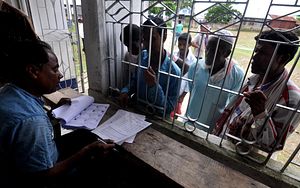Close to 31 million people have been declared citizens by the National Register of Citizens (NRC) in the border state of Assam in India, which published its final list on August 31, bringing to an end a mammoth exercise that started four years ago. The process has also delisted 1.9 million names out of a total of 33 million applicants.
The final count marks an increase of nearly 2.2 million citizens from the draft list published last year and an additional list of exclusion months later, which means that a large number of people who were left out were approved after they filed claims making a case for inclusion in the register. Also, in the final list of delisted people were nearly 400,000 who did not file claims for inclusion after their names were deleted last year.
The NRC which was first prepared in Assam in 1951 is a list of citizens who were able to prove through a set of documents that either they or their ancestors had settled in the state before March 24, 1971, a day before neighboring Bangladesh attained independence from Pakistan. The government had agreed to update the register in an agreement inked with the All Assam Students’ Union (AASU) in 2005. But the exercise was initiated only after the Supreme Court intervened following Public Interest Litigation filed by Assam Public Works four years later.
The register was updated by the Registrar General of India, which also conducts the census operations in the country, and was monitored by the Supreme Court. The compilation of the list incurred an expenditure of 13 billion rupees and engaged as many as 52,000 government employees from different departments across all the thirty three districts of Assam. Controversies had regularly surfaced ever since the update of the register over the victimisation of citizens, and the harassment and inclusion of the names of foreigners through fake documents.
Resentment Over the NRC
Major political parties including the ruling Bharatiya Janata Party (BJP), opposition Congress, and civil society groups erupted in anger after the NRC published the list of citizens. The expectation across the state was a list that would exclude more foreigners than the number gleaned from the NRC list. Media reports have also highlighted several instances of citizens being deleted from the list.
Assam Public Works, which had made a plea for 100 percent reverification of the NRC, has declared the list a “flawed document.” Aabhijeet Sarma, the group’s president, has also cast aspersions on the software being used in the exercise, questioning if it was capable of handling such an enormous volume of data. In the same vein, AASU and other student groups have also expressed their dissatisfaction over the register.
Going a step further was senior BJP leader and minister in Assam Himanta Biswa Sarma who told India Today that 1.4 million foreigners have been identified and that the data in the register was manipulated by foreigners to get their names enrolled. He also said that the NRC was a “mixed bag” and that the process of detecting foreigners would continue in the state.
The BJP is also upset over the exclusion of Bangladeshi Hindus who constitute a secure vote bank for the party. In the last couple of months, the party had expressed concern over the NRC and state chief minister Sarbananda Sonowal had said that, if necessary, “legislative options” would be considered to identify foreigners.
The aggrieved organizations and parties have declared that they will submit petitions to the Supreme Court reiterating their pleas for random reverification of a certain percentage of the NRC.
What Happens to the Delisted People?
The delisted people are not foreigners, but definitely suspects who would may be barred from voting rights in elections. They can now approach the Foreigners’ Tribunals and higher courts for a final judgment on their status. Contrary to the widespread notion, exclusion from the register does not mean incarceration in detention centers straight away.
It is unlikely that Assam will witness disturbances or a drastic change anytime soon on account of the list published by the NRC. The process of adjudication that will finally decide the fate of the delisted people will certainly take years to complete. Currently there are six detention centers across Assam and plans have been firmed up to build 10 more. Declared foreigners are incarcerated for a period of three years and released after certain conditions are fulfilled. To expedite the process of adjudication, the government has also enhanced the strength of the tribunals to 300 and plans are on to constitute another seven hundred.
Evidently, the government lacks the infrastructure to handle a large number of cases in such a brief span of time. This also explains why the time limit for appeal to the tribunals was recently extended from 60 to 120 days. The government has also offered to provide free legal services to the delisted people since a large chunk hail from impoverished economic backgrounds and remote areas.
It may be mentioned that besides the delisted people by the NRC, there are two more categories of foreigners in Assam on whom the government does not have any policy. Over the years, many foreigners have become untraceable who are believed to have settled in different parts of the country. Then, there are foreigners who have been released from the detention centers and around a thousand more would have to be set free which are currently serving sentences.
Rajeev Bhattacharyya is a senior journalist in Assam, India.

































